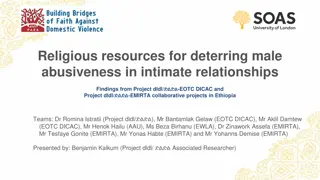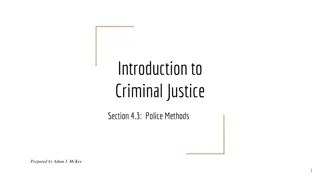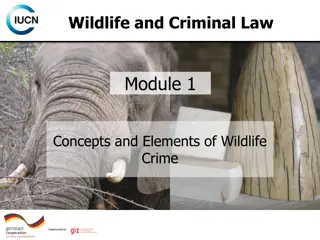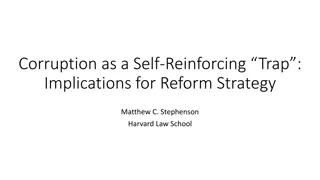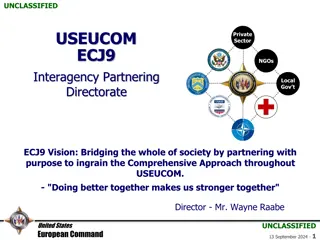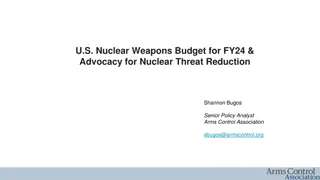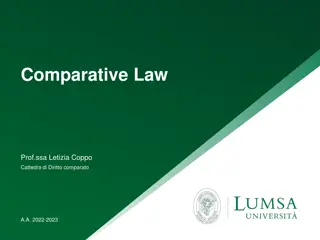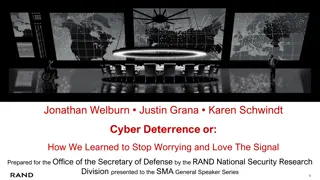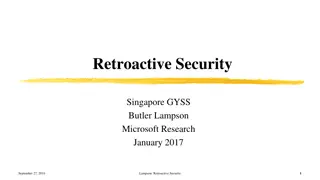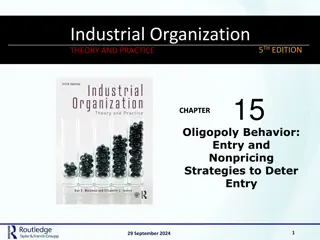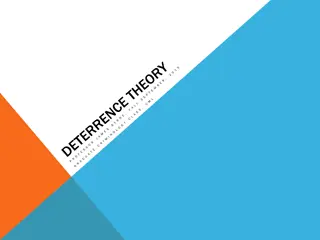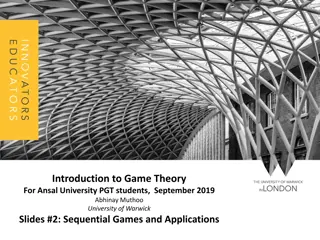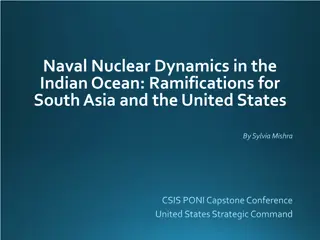Ginzburg Landau phenomenological Theory
The Ginzburg-Landau phenomenological theory explains superconductivity and superfluidity as distinct thermodynamic phases. It focuses on phase transitions characterized by singularities in specific heat at the transition temperature. Derived from BCS theory, it quantifies condensation energy, emphas
1 views • 38 slides
Crystal Field Theory in Transition Metal Complexes
Crystal Field Theory (CFT) explains the colors and magnetic properties of transition metal complexes. It focuses on the energy changes in d-orbitals of metal ions caused by surrounding ligands. This theory, developed in 1929, provides insights into the bonding interactions in complex compounds. The
10 views • 44 slides
Understanding Social Learning Theory and the Power of Example
Social Learning Theory, introduced by Bandura, emphasizes learning through observation and modeling. It explores how individuals acquire behavioral dispositions, trial-and-error experiences, and the impact of stimuli in the environment. The theory focuses on the importance of attention, retention, a
1 views • 17 slides
Evolution of Mathematical Theories and Proof Systems
Development of mathematical theories such as model theory, proof theory, set theory, recursion theory, and computational complexity is discussed, starting from historical perspectives with Dedekind and Peano to Godel's theorems, recursion theory's golden age in the 1930s, and advancements in proof t
1 views • 29 slides
Introduction to Organizational Behavior: Management Theories and Practices
Explore the evolution of organizational behavior from early management theories to contemporary practices. Understand the historical foundations and relevance of management theory in shaping workplace dynamics. Delve into key concepts like Scientific Management, Administrative Management, Bureaucrat
1 views • 28 slides
Theories on the Origin of State: Divine, Force, Patriarchal, and More
Various theories such as Divine Origin, Force Theory, Patriarchal Theory, and others explain the origin of the state. Divine theories attribute state creation to God, while Force Theory emphasizes the strong subjugating the weak to establish authority. Each theory offers unique perspectives on the h
1 views • 24 slides
Understanding Forgetting: Theories and Influence on Memory Recall
Forgetting is a complex phenomenon influenced by theories such as Decay Theory, Interference Theory, and Motivated Forgetting. The Ebbinghaus forgetting curve highlights how memories fade over time. Decay Theory suggests memories decay over time, while Interference Theory explains how old and new me
0 views • 25 slides
Religious Resources for Deterrence of Male Abusiveness in Intimate Relationships
This research project, conducted in collaboration with various organizations and experts, delves into the role of religion in deterring male abusiveness within intimate relationships. Findings suggest that religion can serve as a deterrent at both individual and normative levels, emphasizing faith-b
0 views • 9 slides
Understanding Trust in Contemporary Leadership
Trust is the foundation of effective leadership, comprising elements like integrity, competence, consistency, loyalty, and openness. Trust plays a crucial role in leadership, impacting team performance and cooperation. Different types of trust - deterrence-based, knowledge-based, and identification-
0 views • 9 slides
Psychological Theories of Criminality: Understanding the Roots
Psychological theories of criminality delve into the association between intelligence, personality, learning, and criminal behavior. Major theories include Psychodynamic Theory by Freud, Behavioral Theory by Bandura, and Cognitive Theory by Kohlberg. These theories explore how unconscious mental pro
1 views • 20 slides
Austin's Theory of Law by Rinkey Sharma: An Overview
Austin's Theory of Law, presented by Rinkey Sharma, delves into the Imperative Theory of Law as proposed by Austin, known as the father of English jurisprudence. It explores General and Particular Jurisprudence, Austin's definition of law, and the elements of positive law, emphasizing the concepts o
0 views • 11 slides
Theories of International Relations Overview
The field of International Relations (IR) encompasses various theories that seek to explain global phenomena, drawing from disciplines like history, philosophy, and economics. Theory, derived from contemplation and speculation, organizes ideas to explain issues such as state emergence, conflict caus
1 views • 47 slides
Understanding the Theory of Firms: Neoclassical vs. Modern Approaches
The theory of firms is explored through the Neoclassical and Modern perspectives. Neoclassical theory focuses on profit maximization, while Modern theory delves into managerial, principal-agent, and transaction cost theories. The discussion covers criticisms of Neoclassical theory and the essential
1 views • 79 slides
Theories of Causation in Psychological and Social Sciences
Overview of theories of causation categorized into psychological, social psychological, and sociological perspectives. Psychological theories focus on instinctive, biological, and psychological qualities of abusers, including Attachment Theory, Psychodynamic Theory, Social Learning Theory, and Situa
0 views • 15 slides
Understanding Political Theory through a Contextual Approach
Exploring G.H. Sabine's perspective on political theory through a contextual approach, emphasizing the importance of historical context and societal influences. Sabine argues that while political theory evolves with its contemporary politics, it should be analyzed within its specific time and social
0 views • 9 slides
Evolution of Light Theory: From Wave Theory to Quantum Theory
At the turn of the century, the discovery of the photoelectric effect challenged the wave theory of light, leading to the development of the quantum theory by Max Planck and Albert Einstein. This new theory introduced the concept of discrete energy units known as quanta, bridging the gap between wav
1 views • 62 slides
Evolution of Police Methods in Criminal Justice
Traditional police methods in America primarily involved patrol officers and investigators, with a focus on deterrence, crime prevention, and solving crimes. However, proactive policing strategies emerged in the 1990s to address the limitations of traditional methods. Patrol remains a crucial aspect
5 views • 32 slides
Dp-branes, NS5-branes, U-duality, and M-Theory Overview
Overview of Dp-branes, NS5-branes, and U-duality derived from nonabelian (2,0) theory with Lie 3-algebra. Introduction to M-theory, including M2-branes and M5-branes in the strong coupling limit. Discussion on BLG theory, Lorentzian Lie 3-algebra, and the ABJM theory for M2-branes.
1 views • 32 slides
Evolution of Punishment: From Brutality to Modern Criminal Justice System
Punishment for crime has evolved over time from brutal public spectacles to more civilized forms of discipline in modern society, reflecting changes in ruling class interests. The Criminal Justice System (CJS) focuses on deterrence, public protection, retribution, and rehabilitation. There has been
1 views • 25 slides
Understanding Time-Independent Perturbation Theory in Quantum Mechanics
Perturbation theory is a powerful tool in solving complex physical and mathematical problems approximately by adjusting solutions from a related problem with known solutions. This theory allows for more accurate approximate solutions by treating the difference as a small perturbation. An example inv
0 views • 19 slides
Wildlife Crime and Criminal Law: Understanding Concepts and Elements
Explore the intricate world of wildlife crime and criminal law in this module, covering topics such as defining wildlife crime, compliance approaches, the importance of addressing wildlife crime, motivations behind committing such crimes, and the international and regional dimensions of the issue. G
0 views • 57 slides
Ethical Theories: Divine Command vs. Virtue Theory Explained
Divine Command Theory asserts that morality is derived from God's commands, contrasting with Virtue Theory which focuses on developing moral virtues to achieve human flourishing and excellence. Divine Command Theory relies on religious texts, while Virtue Theory emphasizes the cultivation of virtues
0 views • 24 slides
Unpacking Self-Reinforcing Corruption Patterns
Delve into the complex dynamics of self-reinforcing corruption cycles and their implications for reform strategies. Explore how widespread corruption weakens deterrence, strengthens individual incentives for corruption, and impacts social norms against corrupt practices.
0 views • 45 slides
Enhancing Security Through Whole-of-Society Approach
United States European Command (USEUCOM) and ECJ9 are working to integrate interagency, private sector, NGOs, and local government partners to strengthen defense, deterrence, and resilience. Their focus is on countering hybrid threats, enhancing interoperability, and promoting full spectrum resilien
0 views • 8 slides
Understanding Fermi Liquid Theory in Interacting Fermion Systems
Fermi liquid theory, also known as Landau-Fermi liquid theory, is a theoretical model that describes the normal state of metals at low temperatures. Introduced by Landau and further developed by Abrikosov and Khalatnikov, this theory explains the similarities and differences between interacting ferm
0 views • 23 slides
U.S. Nuclear Weapons Budget for FY24 & Advocacy for Nuclear Threat Reduction Overview
The Fiscal Year 2024 budget for U.S. nuclear weapons activities is $56.6 billion, up by 11% from the FY23 request. The budget includes allocations for the Energy Department, Defense Department, and National Nuclear Security Administration for various nuclear weapon delivery systems and warheads. The
0 views • 5 slides
Understanding Comparative Property Law in the Contemporary Legal Landscape
Comparative Property Law explores the common challenges and fundamental questions of contemporary tort law, covering topics such as tort liability, legal positions protected by tort law, criteria for attributing liability, compensatory, deterrence, and punitive functions of tort law, and more. The i
0 views • 37 slides
Computational Learning Theory: An Overview
Computational Learning Theory explores inductive learning algorithms that generate hypotheses from training sets, emphasizing the uncertainty of generalization. The theory introduces probabilities to measure correctness and certainty, addressing challenges in learning hidden concepts. Through exampl
0 views • 43 slides
Automata Theory and Theory of Computation Overview
This course overview covers concepts in automata theory and theory of computation, including formal language classes, grammars, recognizers, theorems in automata theory, decidability, and intractability of computational problems. The Chomsky hierarchy, interplay between computing components, modern-
0 views • 42 slides
Enhancing Cyber Deterrence Strategies in the Modern Age
The current state of cyberspace reveals persistent threats targeting the U.S., emphasizing the need for effective deterrence strategies. Calls for a comprehensive cyber deterrence framework have been made by key committees, highlighting the urgency to develop response options, denial strategies, and
0 views • 33 slides
Retroactive Security Approach by Butler Lampson in January 2017
Retroactive security proposed by Butler Lampson addresses the limitations of traditional access control mechanisms. Emphasizing a focus on events that have actually occurred, this approach aims to improve real-world security by enabling accountability, blame assignment, and selective undo capabiliti
0 views • 20 slides
Theories of Interest in Microeconomics II
Explore various theories of interest in economics, including the Classical Theory, Liquidity Preference Theory by Keynes, Productivity Theory, Abstinence Theory, Time-Preference Theory, Fisher's Time Preference Theory, and the Loanable Fund Theory. These theories offer different perspectives on the
0 views • 6 slides
Exploring the Evolution of Atomic Theory
Delve into the historical journey of atomic theory starting from Democritus and Aristotle's views to modern advancements proving some aspects of Dalton's theory incorrect. Learn about key laws and theories such as the Particle Theory of Matter, Dalton's Atomic Theory, and JJ Thomson's discoveries, s
0 views • 30 slides
Oligopoly Behavior: Excess Capacity Models and Entry Deterrence Strategies
Examine the concept of excess capacity models in oligopoly behavior, where a monopolist may strategically deter entry by either building excess capacity or expanding current production facilities in response to potential entrants. Explore scenarios involving sunk costs, marginal costs, pricing strat
0 views • 37 slides
Future Growth and Economic Impacts of GBSD Program in Northern Utah
Ground Based Strategic Deterrence program is set to bring substantial growth opportunities to Northern Utah, with an influx of jobs, economic impacts, and community development. The program's current situation at Hill AFB shows stability and promising future prospects, with significant contracts awa
0 views • 12 slides
Understanding Deterrence Theory and Classical Criminology
The content provides an overview of deterrence theory, focusing on key figures, assumptions, general and specific deterrence, research, and policy implications. It also delves into classical criminology, discussing key figures like Jeremy Bentham and Cesare Beccaria, concepts such as felicity calcul
0 views • 21 slides
Understanding the Aims of Punishment and Evaluating Deterrence as an Effective Aim
Explore the aims of punishment and the reasons behind punishing criminals in different ways through a series of tasks. Match descriptions to aims, identify and explain key aims of punishment, and evaluate the effectiveness of deterrence as a primary aim. Provide reasoned arguments, consider religiou
0 views • 4 slides
Understanding Sequential Games in Game Theory
Explore the concept of sequential games in game theory through an entry deterrence game involving an incumbent monopolist and a potential entrant. The game tree depicts various outcomes based on choices made by players, leading to discussions on Nash Equilibrium, credible commitments, and backward i
0 views • 17 slides
Macromechanical Analysis of Lamina and Tsai-Hill Failure Theory Overview
The Tsai-Hill failure theory is based on the strengths of a unidirectional lamina, incorporating longitudinal and transverse tensile and compressive strengths, as well as in-plane shear strength. This theory, derived from the distortion energy theory, provides criteria for determining lamina failure
0 views • 15 slides
Naval Nuclear Dynamics in the Indian Ocean: Implications for South Asia and the United States
Delve into the complexities of naval nuclear dynamics in the Indian Ocean, exploring strategic developments, India's sea-based deterrence efforts, and the geopolitical implications for South Asia and the United States. Assess the simultaneous rise of China and India, the influence of major chokepoin
0 views • 14 slides







